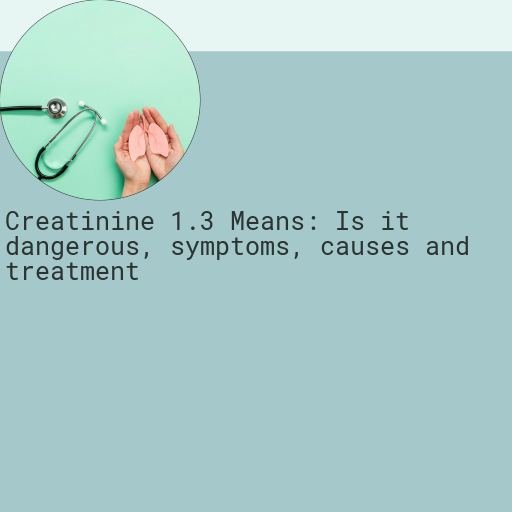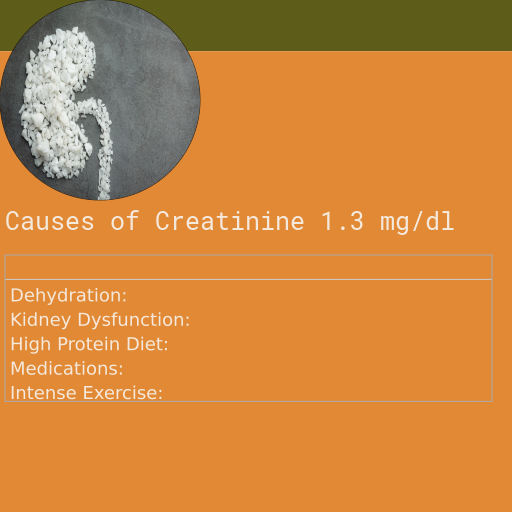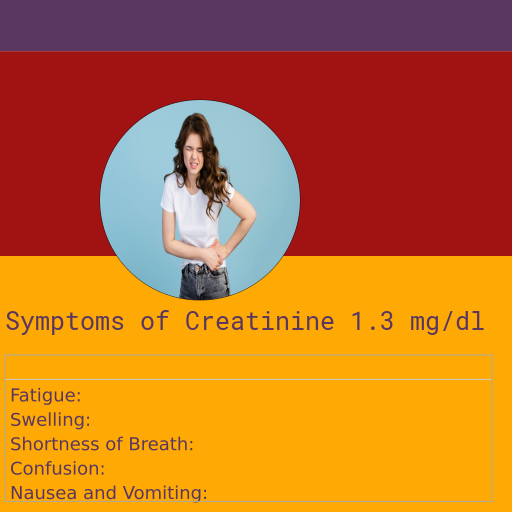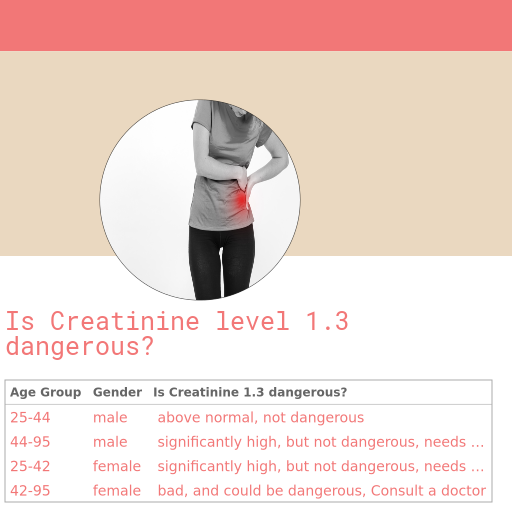Creatinine 1.3 : Is it Dangerous, Causes, Symptoms and More
When it comes to understanding our health, creatinine levels play a crucial role. Creatinine is a waste product generated from muscle metabolism, and its levels in the blood can be an important indicator of kidney function. Elevated creatinine levels, such as a reading of 1.3, might raise concerns about potential kidney issues. This blog aims to delve into the causes of high creatinine levels, explore the accompanying symptoms, and discuss possible treatment options to manage and reduce these levels effectively. Understanding these aspects can aid in early detection and prevention of more serious health problems.

What is Creatinine
Creatinine is a byproduct of protein breakdown, specifically from muscle metabolism. It is essentially a waste product that the body does not use for any functional purpose. Instead, it is filtered out of the blood by the kidneys and excreted in urine. Because creatinine has no essential role in the body, its levels in the blood can provide important insights into kidney health. Elevated levels of creatinine may indicate that the kidneys are not functioning properly, as they are unable to efficiently remove this waste product from the bloodstream.
- Muscle Metabolism: Creatinine is a waste product generated from muscle metabolism. It is produced when creatine, a molecule important for energy production in muscles, is broken down.
- Dietary Intake: Consumption of meat and other protein-rich foods can increase creatinine levels in the body. Animal muscles contain creatine, which converts to creatinine during digestion.
- Supplements: Some people take creatine supplements to enhance athletic performance. This can lead to elevated creatinine levels as the body processes the additional creatine.
- Kidney Function: The kidneys are responsible for filtering creatinine out of the blood. If kidney function is impaired, creatinine levels can accumulate in the bloodstream.
- Medications: Certain drugs, such as nonsteroidal anti-inflammatory drugs (NSAIDs) and some antibiotics, can affect kidney function and lead to increased creatinine levels.
- Dehydration: Lack of adequate hydration can concentrate creatinine levels in the blood, making them appear higher than they actually are.
Normal Range of Creatinine in Adults
The normal range of creatinine levels in adults varies slightly depending on several factors such as age, gender, and muscle mass. Typically, for adult men, a creatinine level falls between 0.6 to 1.2 milligrams per deciliter (mg/dL), while for adult women, it ranges from 0.5 to 1.1 mg/dL. These values can act as a crucial indicator of kidney health, as elevated levels may suggest impaired kidney function or other underlying health issues. Regular monitoring of creatinine levels is essential for maintaining overall health and early detection of potential kidney problems.
| Age Group | Normal Creatinine Range (mg/dL) |
|---|---|
| Infants (0-1 year) | 0.2 - 0.4 |
| Children (1-12 years) | 0.3 - 0.7 |
| Adolescents (13-18 years) | 0.5 - 1.0 |
| Adult Males (19-60 years) | 0.6 - 1.2 |
| Adult Females (19-60 years) | 0.5 - 1.1 |
| Older Adults (60+ years) | 0.5 - 1.2 |
Causes of Creatinine 1.3
Elevated creatinine levels can be a cause for concern as they often indicate underlying health issues. Creatinine, a waste product produced by the normal breakdown of muscle tissue, is filtered by the kidneys and excreted in urine. When the kidneys are not functioning properly, creatinine levels can build up in the blood. Common causes of elevated creatinine include chronic kidney disease, dehydration, and conditions that affect kidney function such as diabetes and high blood pressure. Understanding these causes is crucial for early detection and treatment of potential kidney problems.
- Dehydration: A lack of adequate fluids can lead to higher creatinine levels.
- Kidney Dysfunction: Conditions such as chronic kidney disease or acute kidney injury impair the kidneys' ability to filter waste.
- High Protein Diet: Consuming large amounts of protein can increase creatinine production in the body.
- Medications: Certain drugs, such as nonsteroidal anti-inflammatory drugs (NSAIDs) and some antibiotics, can affect kidney function and raise creatinine levels.
- Intense Exercise: Vigorous physical activity can lead to muscle breakdown, releasing more creatinine into the bloodstream.
- Diabetes: Poorly controlled blood sugar levels can damage the kidneys over time, contributing to elevated creatinine.
- High Blood Pressure: Hypertension can cause kidney damage and subsequently increase creatinine levels.
- Urinary Tract Obstruction: Blockages in the urinary tract, such as kidney stones, can prevent normal urine flow and lead to higher creatinine levels.

Symptoms of Creatinine 1.3
When it comes to understanding the implications of elevated creatinine levels, recognizing the symptoms is crucial. Elevated creatinine can be a sign that your kidneys are not functioning properly, and it often manifests through a variety of physical signs. Common symptoms include fatigue, swelling in the lower extremities, and changes in urine output. In more severe cases, individuals may experience shortness of breath and confusion. Being aware of these symptoms can help in early detection and prompt treatment, potentially preventing more serious health issues.
- Fatigue: Elevated creatinine can lead to decreased kidney function, causing overall tiredness and lack of energy.
- Swelling: An increase in creatinine levels can result in fluid retention, leading to swelling in the legs, ankles, and face.
- Shortness of Breath: When kidneys are not functioning properly, fluid can accumulate in the lungs, causing difficulty in breathing.
- Confusion: High levels of waste products in the blood due to poor kidney function can affect brain function, leading to confusion and disorientation.
- Nausea and Vomiting: Elevated creatinine levels can cause gastrointestinal issues, including nausea and vomiting.
- Muscle Cramps: Electrolyte imbalances resulting from impaired kidney function can lead to muscle cramps and spasms.
- Decreased Urine Output: One might notice a significant reduction in the amount of urine being produced, indicating kidney issues.
- Itchy Skin: Accumulation of waste products in the blood can cause intense itching and dryness of the skin.

Dangers of Creatinine 1.3
When discussing the implications of creatinine levels, it's important to note that while creatinine itself does not directly harm the body, its elevated levels serve as a crucial indicator of potential underlying health issues, particularly kidney failure or other renal problems. When the kidneys are not functioning properly, they fail to efficiently filter out waste products, leading to an accumulation of harmful substances like urea in the bloodstream. These waste products, unlike creatinine, can significantly damage the body, causing symptoms and complications that require medical attention.
- Kidneys: Elevated creatinine levels can indicate kidney dysfunction, leading to compromised filtration and accumulation of waste products in the body.
- Heart: High creatinine levels may correlate with cardiovascular diseases and increased risk of heart attacks or strokes due to poor kidney function.
- Liver: Impaired kidney function can place additional strain on the liver, potentially resulting in liver damage or exacerbating existing liver conditions.
- Lungs: Elevated creatinine can lead to pulmonary edema, where fluid builds up in the lungs, causing difficulty in breathing and reduced oxygen exchange.
- Brain: High levels of creatinine can cause cognitive impairments, including confusion and memory issues, due to toxins affecting brain function.
- Muscles: Increased creatinine may lead to muscle cramps and weakness, as muscle metabolism and function are adversely affected.
- Digestive System: Elevated creatinine can cause nausea, vomiting, and loss of appetite, impacting overall nutrition and digestion.
- Skin: High creatinine levels can result in itchiness and dry skin, reflecting the body's struggle to eliminate waste effectively.
Home remedies for Creatinine 1.3
Disclaimer: Elevated creatinine levels should not be treated at home without professional medical advice. Creatinine elevation often indicates underlying health issues that require proper diagnosis and treatment by a healthcare provider. While basic supportive care can help manage symptoms, it is crucial to follow a doctor's recommendations. Supportive measures may include staying well-hydrated, avoiding strenuous exercise, and adhering to a balanced diet low in red meat and high in fruits and vegetables. However, these steps are not substitutes for medical treatment and should only be part of a comprehensive care plan supervised by a healthcare professional.
- Stay Hydrated: Drinking plenty of water can help your kidneys function better and may aid in lowering creatinine levels.
- Follow a Kidney-Friendly Diet: Reduce intake of foods high in potassium, phosphorus, and sodium. Opt for fresh fruits and vegetables that support kidney health.
- Avoid Over-the-Counter Painkillers: Non-steroidal anti-inflammatory drugs (NSAIDs) can harm your kidneys. Consult your doctor for safer alternatives.
- Engage in Regular Exercise: Moderate physical activity can improve overall health and support kidney function, but avoid overexertion that could stress your kidneys.
- Monitor Blood Pressure and Blood Sugar Levels: Keeping these under control can prevent further kidney damage. Use home monitoring devices as recommended by your healthcare provider.
Treatment for Creatinine 1.3
If your creatinine level is 1.3, medical treatment by a doctor is crucial to address the underlying causes and prevent further complications. The primary treatment goals include stabilizing kidney function, which may involve adjusting medications that could be harming your kidneys. It's essential to stop any harmful drugs that may be contributing to elevated creatinine levels. Additionally, if an infection is present, appropriate antibiotics or antiviral medications will be administered. Monitoring and managing underlying conditions such as diabetes or hypertension are also critical components of the treatment plan to ensure overall kidney health.
- Hydration: Ensure adequate water intake to help the kidneys filter waste more efficiently.
- Dietary Changes: Reduce protein intake and adopt a kidney-friendly diet to lessen the burden on your kidneys.
- Medications: Take prescribed medications to manage underlying conditions such as high blood pressure or diabetes.
- Lifestyle Modifications: Incorporate regular exercise and maintain a healthy weight to support overall kidney health.
- Regular Monitoring: Schedule frequent check-ups to monitor creatinine levels and adjust treatment plans as necessary.
GFR with Creatinine of 1.3
When discussing kidney health, it's crucial to understand the concept of the Glomerular Filtration Rate (GFR). GFR is a measure of how well your kidneys are filtering blood, and it provides a more comprehensive picture of kidney function compared to an absolute creatinine value. While creatinine levels can indicate potential kidney issues, they can be influenced by factors such as age, gender, and muscle mass. In contrast, GFR takes these variables into account, offering a more accurate assessment of kidney health. Therefore, healthcare providers often rely on GFR to determine the stage of kidney disease and to tailor treatment plans more effectively.
| GFR Grade | GFR Range (mL/min/1.73m²) | Kidney Function | Description |
|---|---|---|---|
| G1 | ≥ 90 | Normal or High | Normal kidney function but may have other signs of kidney disease. |
| G2 | 60-89 | Mildly Decreased | Mild decrease in kidney function, and may have other signs of kidney disease. |
| G3a | 45-59 | Mildly to Moderately Decreased | Moderate decrease in kidney function that requires monitoring and possible lifestyle changes. |
| G3b | 30-44 | Moderately to Severely Decreased | More significant decrease in kidney function; may need to see a nephrologist. |
| G4 | 15-29 | Severely Decreased | Severe decrease in kidney function, usually requiring management by a nephrologist. |
| G5 | < 15 | Kidney Failure | Kidney failure, requiring dialysis or a kidney transplant. |
What is my GFR for a creatinine of 1.3
| Age | Gender | GFR |
|---|---|---|
| 18 | male | 71.9 ml/m2 |
| 45 | male | 59.7 ml/m2 |
| 60 | male | 56.31 ml/m2 |
| 80 | male | 53.12 ml/m2 |
| 18 | female | 53.35 ml/m2 |
| 45 | female | 44.29 ml/m2 |
| 60 | female | 41.78 ml/m2 |
| 80 | female | 39.41 ml/m2 |
Table of danger posed by Creatinine 1.3 in male across different ages
| Age Group | Is Creatinne of 1.3 dangerous? |
|---|---|
| 25yrs - 44 yrs | above normal, not dangerous |
| 44yrs - 95 yrs | significantly high, but not dangerous, needs attention |
Table of danger posed by Creatinine 1.3 in female across different ages
| Age Group | Is Creatinne of 1.3 dangerous? |
|---|---|
| 25yrs - 42 yrs | significantly high, but not dangerous, needs attention |
| 42yrs - 95 yrs | bad, and could be dangerous, Consult a doctor |

Which other tests should be done for a creatinine value of 1.3?
When assessing kidney function, a creatinine level of 1.3 may prompt healthcare providers to delve deeper into the patient's overall health through a series of additional tests. Among these, evaluating electrolytes such as sodium, potassium, and chloride can provide crucial insights into the body's balance of fluids and electrolytes, which is often disrupted in kidney disorders. A comprehensive renal profile can further illuminate the extent of kidney function and damage by including measures such as blood urea nitrogen (BUN) and glomerular filtration rate (GFR). Additionally, analyzing blood gas levels helps in understanding the acid-base balance in the body, which can be affected by impaired kidney function. These tests collectively offer a more holistic view, enabling a more accurate diagnosis and effective treatment plan.
- Electrolytes: This test measures levels of essential minerals like sodium, potassium, and chloride in your blood. Imbalances can indicate kidney dysfunction or other metabolic issues.
- Renal Profile: A comprehensive panel that includes tests such as blood urea nitrogen (BUN) and glomerular filtration rate (GFR) to assess overall kidney health and function.
- Blood Gas Levels: These tests measure the amounts of oxygen and carbon dioxide in the blood, as well as the blood's pH balance. Abnormal results can point to issues with kidney function or respiratory problems.
- HbA1c: This test provides an average blood glucose level over the past two to three months, helping to diagnose and monitor diabetes, which can affect kidney health.
- Liver Enzymes: Tests such as ALT, AST, and ALP measure liver function. Elevated levels can indicate liver damage or disease, which can also impact kidney function.

 By: Dr.Bhargav Raut
By: Dr.Bhargav Raut